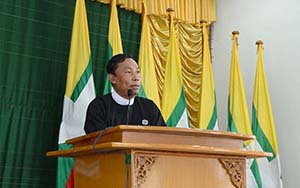The Shan state government has demanded the Union Parliament to increase state budget sharing to 50%. At present, the state treasury receives only 7% of the state budget.
 Sai Eaik Pau, the Minister of Shan state Forest and Mining made this demand to the Union Parliament Speaker Thura Shwe Mahn on September 2 at a meeting in Taunggyi.
Sai Eaik Pau, the Minister of Shan state Forest and Mining made this demand to the Union Parliament Speaker Thura Shwe Mahn on September 2 at a meeting in Taunggyi.
He also called for decentralization and federal system of government. Furthermore, he demanded the government to issue national IDs to ethnic Shan migrant workers when they return from Thailand.
Similarly, Members of the Shan state Legislative Assembly discussed various issues with the Speaker including details of correct ethnic group in the national IDs, tackling drug abuse and trafficking problems, federal state system that ethnic groups have been demanding, work completed by the 2008 Constitution Review Committee, environmental issues and land issues.
The Speaker responded that he came to the meeting to listen to the voice of the people, fulfill their desires and resolve their difficulties through coordination between the government and the people. He urged everyone present at the meeting to present all of their difficulties and issues in front of their elected government and representatives.
Thura Shwe Mahn said, “The call for federal system of government is getting louder. Failing to deliver it will cause obstacles to national integrity, reconciliation and maintenance of law and order in the country. The proposition is not an unreasonable one. So we shall do what we can, under the given circumstances. For this, the state government, organizations as well as the people should bear responsibility.”
Nan Ngwe, Shan state Legislative Assembly Member told Mizzima, “The presentations submitted at this meeting by each individual from southern Shan state represent the aspirations of the people, so it is important to fulfill these demands.”
The meeting was attended by over 500 people including ethnic literary figures, artiste, troupes, Chairpersons of Self-administered zones, Ministers, the Legislative Assembly Speaker and Members from Shan and Kayah states, ethnic political parties, ethnic affairs Ministers, members of village-tracts and wards support groups and officials from governmental departments among others.



